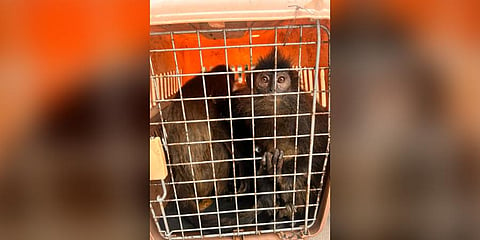

GUWAHATI: Forty-one exotic animals were rescued by the police in Assam on Thursday and officials said the risk of zoonotic diseases in such cases is always a concern.
The animals rescued from two SUVs include kangaroos, different primate species, wild birds and tortoises. Two of the tortoises died and the rest of the animals are being quarantined at the Guwahati Zoo.
Divisional Forest Officer Sunny Deo Singh said mortality is common among exotic animals when they are on international transit with climate change being one of the factors.
“These animals were smuggled from another country. We don’t know what they were fed and how they were handled by the smugglers. Normally, 50 per cent of exotic animals die during transit. And even when they are taken to a zoo, they will be in a critical condition,” Singh said.
He said during legal international transit, the health of animals is monitored on the border as per procedures keeping zoonotic diseases in mind but in this case, nothing of that sort happened as the smugglers had directly brought them.
“The animals travelled a long distance from the Myanmar border and they were handled at several places before being kept in isolation at the zoo. There was no monitoring of the zoonotic diseases all the way. This is dangerous. Keeping the Covid pandemic in mind, we cannot take this lightly,” Singh said.
ALSO READ | Kangaroos, 19 primate species among 41 ‘exotic’ animals seized in Assam
The animals were rescued at 5:30 am on Thursday at Rangiya in Kamrup district and they were sent to the zoo at around 8 pm after the authorities followed due legal process. Well-known elephant expert Kaushik Barua agreed on the risk of zoonotic diseases.
“The origin of these exotics is unknown and we don’t know if they were screened before being sent. The risk of zoonotic diseases in such cases always remains a question,” Barua said.
He said many such seizures had taken place in Assam over the last few months and the animals were sent to the zoo. The zoo has limited facilities to isolate animals. Beyond a point, the system risks being overwhelmed, he added.
Zoo veterinarian Dr Shankar Sharma said the rescued animals had been kept away from the other animals and human beings.
ALSO READ | Rare species of fire ant colonised Brahmansahi: Experts
“I agree that zoonotic diseases spread to animals as well as human beings. So, whenever we rescue an animal, exotic or otherwise, we keep it isolated and do whatever is necessary. We quarantine it for one to three months and observe it,” Sharma said.
He said the animals were found extremely stressed and the next few days would be crucial for them. “We are giving them food and whatever is needed,” he added.